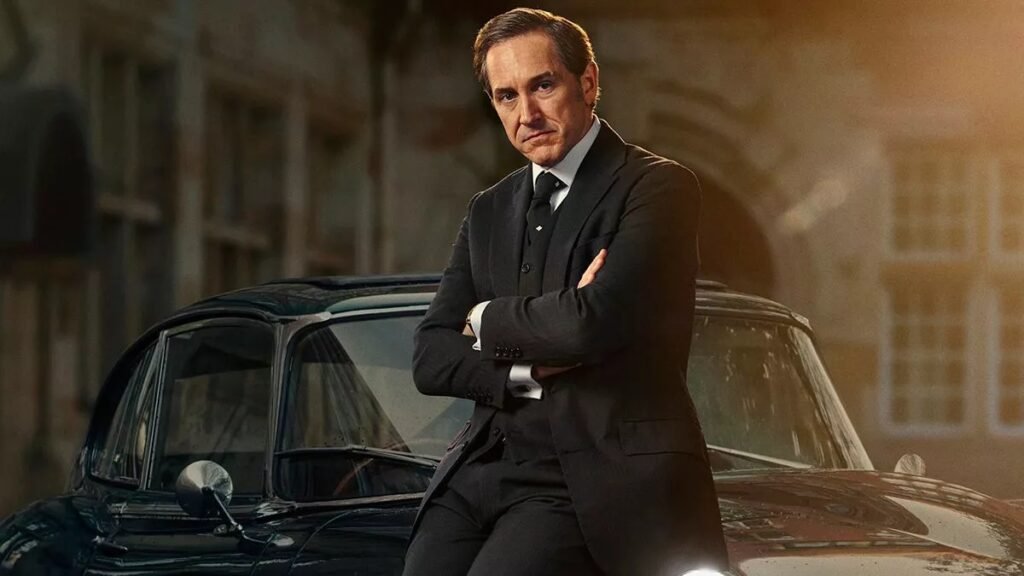
We’re thrilled by the return of Dalgliesh to Channel 5 – as played by Bertie Carvel, the character brings nuance and sensitivity to detective work that complements the fine production of the series. In these three two-parters, Commander Dalgliesh investigates the death of an archdeacon, the murder of a maid, and a string of killings with a possibly political motive – but can Dalgliesh find any solace for his own troubled soul?
We were very impressed by the previous two series on C5. Though there have been TV adaptations of PD James’ Adam Dalgliesh before, notably starring Roy Marsden and Martin Shaw, it’s in Bertie Carvel’s performance that we feel we have seen the most personal interpretation of the character. Dalgliesh is burdened by the tragic deaths of his wife and child, and though this makes him see the world through grieving eyes, it does seem to give him immense sympathy for both the victims and the perpetrators of crime. Dalgliesh’s approach is so ‘velvet glove’ that his suspects seem to miss the iron fist inside; in fact, he questions them so gently that you’ll usually need the subtitles on to follow the dialogue.
In the two-parter Death In Holy Orders (actually one of the later novels, 11th of 14), it’s 1979, and yes, Dalgliesh is still writing poetry (and doing well out of it, judging by his lush London flat), and does still have the gorgeous green E-type Jaguar from previous series; but initially there’s no sign of his sidekick DS Kate Miskin (Carlyss Peer). She’s off on an attachment somewhere, leaving Dalgliesh in the stolid hands of DS Daniel Tarrant (Alistair Brammer), who Dalgliesh rightly finds lacking in empathy and humility.
Dalgliesh is assigned to ‘sensitive’ investigations, such as that of Archdeacon Crampton (Andrew Havill), found battered to death with a candlestick in a seminary. Try to ignore the Father Ted overtones – this is very much an Agatha Christie-style country house mystery; the trainee priests are off on holiday, so the suspects, an assortment of dodgy religious types, drunken housekeepers and leery groundsmen, are all confined to the big dark house while the investigation takes place.
Everyone hated the Archdeacon, who wanted to close the seminary and sell its art assets – but is the motive for his murder more to do with a scandal involving one of the trainees, or a secret involving the inheritance of the seminary? When a second murder takes place, the plot only becomes more mysterious – Dalgliesh has to struggle with his own faith and issues with the church, as dirty secrets come out and hidden motives are revealed. And is there even a chance of romance for Dalgliesh with an appealing art historian? (who drives a very nice red Triumph Spitfire).
There’s terrific casting in this episode, with the ever-reliable Anton Lesser (Endeavour), Claire Goose (Waking The Dead) and Richard Lintern (Silent Witness) in support. Also worthy of note is the set dressing, as always accurate to a tee and recalling the gloom of the 1970s in every detail. One of the things we enjoy about Dalgliesh is that the period setting precludes any of the crimes being solved by CCTV, ANPR, internet research or mobile phone data, as usually seems to be the case with, for instance, Vera.
As before, the series is shot in Northern Ireland (though the isolated seminary in Death in Holy Orders could indeed be anywhere).
Acclaimed screenwriter and playwright Helen Edmundson (The Suspicions of Mr Whicher, An Inspector Calls, Small Island) returns as lead writer and executive producer for the third series with Colette Kane (Temple, Moving On, Department Q) joining as writer for Death In Holy Orders. Geoff Sax (Us, Endeavour, Victoria) directs.
Death in Holy Orders just leaves us crying out for more, but with the completion of nine stories, will the series come to an end? We hope not – it would be fitting if the whole series of novels could be adapted, and Bertie Carvel’s performance became as definitive as, say, Jeremy Brett’s as Sherlock Holmes or David Suchet’s as Poirot.
Chris Jenkins




